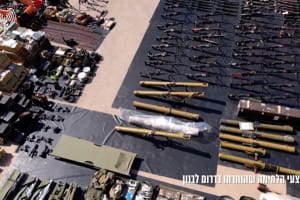Poll: Most Israelis believe hostage deal more important than Rafah operation

The Israeli government’s official goals in the Gaza War are bringing the hostages home and dismantling the Hamas terror militia as a military and political threat. However, according to a fresh poll conducted by the Israel Democracy Institute (IDI), Israelis are divided concerning the order of priority between the two.
The survey results revealed that 56% of Jewish Israelis reportedly believe that reaching a deal to release the Israeli hostages being held by Hamas in Gaza is more important than the IDF's operation in Rafah, a town in southern Gaza located near the Egyptian border. However, a sizeable minority of those surveyed (37%) do believe that military operation should be the main focus.
The IDI poll indicated that political affiliation is a central factor in shaping Israelis’ perceptions and priorities, however, the overall picture concerning national priorities revealed the complexity of the situation.
A whopping 92.5% of left-wing Israelis and 78% of centrist Israelis prioritized a hostage deal over military action. Furthermore, 88.5% of Arab Israelis also prioritize a hostage deal.
Only 8% of Arab Israelis believe that defeating Hamas is the most important goal.
By contrast, 55% of right-wing Israelis believe that a military operation in Rafah is more important. Even so, a large minority of conservative Israelis place a hostage deal ahead of military operations.
Just 3 months earlier, in February, about 40% of Israelis responded that eliminating Hamas was more important than bringing home the hostages, according to a poll conducted by the Jewish People Policy Institute (JPPI). At the time, the same poll indicated that only 32% of the Israeli public prioritized the hostages over defeating Hamas.
“If it is not possible to achieve the two goals of the war – returning the hostages and ousting Hamas from power – and Israel is forced to choose between them, what is the proper choice? It turns out that the majority of the public prioritizes overall national security considerations above everything else,” the JPPI head Prof. Yedidia Stern concluded.
It is not clear whether the latest poll represents a long-term shift in priorities among the Israeli public.
One possible explanation for the increasing dissatisfaction could be genuine fear that the status quo threatens the survival of the remaining hostages, while military operations can always be postponed, if necessary.
In late April, Israeli officials estimated that as many as 98 of the 133 Israeli hostages being held in Gaza might still be alive, following the confirmation of the deaths of 35 hostages.
On Tuesday, Israeli forces captured the Rafah border crossing between Gaza and Egypt after Hamas rejected an Egyptian-mediated hostage deal that U.S. Secretary of State Antony Blinken had described as "extraordinarily generous" on the part of Israel.
The aim of what the government defined as a “limited operation” is to increase the military pressure on Hamas to release the remaining hostages held in Gaza. Israeli Defense Minister Yoav Gallant emphasized again that Hamas only responds to military force. Gallant vowed that the Israeli military action in Rafah “will not stop until Hamas is eliminated in the area, or the first hostage returns to Israel.”
Many Israeli political and military leaders argue that capturing Rafah is crucial to defeating Hamas and saving the hostages. Most of the terrorist organization’s remaining four battalions are concentrated in the Rafah area, according to Israel Defense Fores.
Israeli leaders also believe that some of Gaza's top Hamas leaders and hiding in the tunnel system below Rafah, where hostages are also likely being held.

The All Israel News Staff is a team of journalists in Israel.













